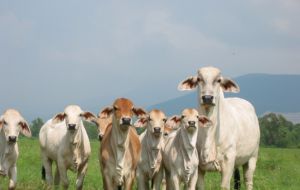MercoPress. South Atlantic News Agency
Rocketing values for cattle in Brazil anticipate ‘beef prices will remain high’
 Grazing land loosing ground to two-crops per annum agriculture
Grazing land loosing ground to two-crops per annum agriculture World beef prices look set to stay high long term given the rocketing prices of raising cattle in Brazil, and the lack of an obvious successor as the world's low-cost producer.
The impact on ranchers' costs of factors such as competition for land with grain and sugar growers, and of the appreciating Brazilian Real, has already eroded the costs advantage which drove the country to top rank in world beef exports, Rabobank said.
“Rises in Brazilian cattle prices have impacted its competitiveness on the world beef market,” Rabobank analyst Wendy Voss said, noting that a “surge” since 2008 had taken prices above those in Australia in US dollar terms.
“That would have been unthinkable as recently as five years ago.”
And costs looked set for further increases, thanks to rising feed prices and bills for meeting tougher environmental impact criteria, following global concerns over the clearing of Amazon forest land for cattle, besides the continuing fight for land.
Indeed, with returns from cattle finishing less than half those that farmers’ double-cropping corn after soybeans can garner, beef operations are being forced to remote northern areas which present further challenges to keeping bills down.
“The northern regions tend to be farther away from consumers and export-shipping ports,” Ms Voss said, noting that the north western area of Rhondonia was a 2,500km trip, largely on poor roads, from Santos, Brazil's main port for beef as well as many other commodities.
“Land development costs tend to be high as well,” requiring applications of lime, minerals and fertilizer costing about 600 USD an acre.
Even so, the cattle herd in northern Brazil, including Rhondonia, has more than tripled to 35m head since 1985, exceeding the population in the south east region, including states such as Sao Paolo, which was historically the cattle-raising heartland, but where animal numbers have declined.
The rises meant the “days of cheap and widely-available Brazilian beef appear to be over”, Ms Voss said. “Brazilian cattle prices are likely to remain at above-historical levels.”
And while the country's higher production costs were driving some beef demand to rivals such as New Zealand and Uruguay, besides the historic giants of Australia and the US, “there appears to be no obvious successor to the Brazilian crown”.
She added: “So as demand for meat in developing markets continues to rise, and demand in developed markets recovers, the world will need to pay higher beef prices to stimulate global beef supply.”
Demand in Brazil, which still consumes about 80% of domestic beef production, is being spurred besides population growth by an increasing taste for the meat, with consumption per person rising from 34 kilos in 2004 to 37 kilos by 2009.




Top Comments
Disclaimer & comment rules-

Read all commentsRabobank (a dutch bank specialized in Agriculture) knows why beef prices will remain high. To bad, or perhaps Mercopress left it out, I don't know, Rabobank doesn't explain that beef prices (like many other commodities) are priced in Dollars and it's really the decline of the dollar that's driving the action. Beef is a commodity that's priced in dollars that is falling + it's in high demand by foreigners who pay in dollars, the producer must raise it's prices to break even/make a profit (before he swaps into his own currency that is gaining against the dollar). One of the solutions is trade outside the US dollar, don't accept any transactions in US dollars anymore, that is being manipulated by the FED to keep US exports “competative”. Of course, they aren't serious about that either, thanks to more regulations created by their friends in DC that works against US businesses. What they really doing is..as you know, help their speculator banksters (by keeping interest rates close to zero and more printing QE1,2, 3 etc etc all those stimulus packages, you name it) and the rest can eat virtual beef on Farmville or wherever. Conclusion, Rabobank (who also received free money from the FED through the bailout of AIG...http://www.rense.com/general85/own.htm) knows that QE3 is comming what will keep commodities (beef) high.
Jun 09th, 2011 - 12:51 am 0Commenting for this story is now closed.
If you have a Facebook account, become a fan and comment on our Facebook Page!